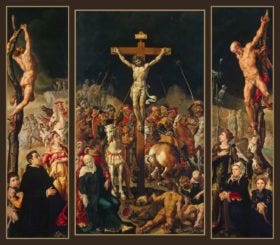The Intercession of the Cross
Is it the Last Words or the Last Song of Jesus on the Cross?
Now from the sixth hour, darkness was over all the land until the ninth hour. And about the ninth hour, Jesus cried out with a loud voice, saying, “Eli, Eli, lema sabachthani?” that is, “My God, my God, why have you forsaken me?”[1]
This verse isn’t signifying that Jesus is somehow separated from the Father. Instead, it indicates the power of Jesus’s intercession on the Cross. God cannot be separated from God. Matthew is quoting the words of Jesus from Psalm 22. The Psalms are prayers that were sung; therefore, Jesus would not have quoted just part of a psalm; He would have sung this prayer. These weren’t Jesus’s last words. Instead, as Dr. Leonard Sweet often says, it was “His last song.”
N. T. Wright argues for this regarding the solidarity of Jesus while on the Cross:
The strange act of asking why God had forsaken Him has been analyzed by scholars and theologians for what it means about our theology of the incarnation or the Trinity. But we often miss that Jesus was praying the words of Psalm precisely because that was the prayer of many Jewish martyrs in the first century. Jesus prayed in solidarity with the suffering, dying the vile and shameful death on the cross. Indeed, His death was the ultimate prayer of solidarity. And every prayer of lament which we offer is another “Amen”.[2]
Through His incarnation, Jesus took on the identity and vocation of Israel, who would have lamented with this prayer while in exile from the Holy Land. At the same time, Jesus took on the identity and vocation of the first Adam, exiled from the Tree of Life in the Garden. It would have been at the time when darkness was over the land that Jesus entered our exile to bring us back into union with the Triune God through the intercession of the Cross. He poured His fullness into our emptiness by taking on the Spirit for us and as us so that we, through union with Him, would become the place of God’s habitation.
It is by the way that He died that Jesus, who is God, took on the form of those who were in exile from God’s presence and atoned for them within His own Body for us to become the habitation of His glory. Through the intercession of the Cross, we were reconciled and brought into union with that same body.
It is by His death that death was conquered, and by His life, we embrace the fellowship of His sufferings so that as His death continues to work in and through us, resurrection life can flow to others. This is how we embody the intercession of the Cross.
On Good Friday, God dies. God dies and is dead—as surely as we shall be. God dies to be with the dead in death, falling freely against his will into godforsakeness so that those who have been forsaken and have forsaken others are not alone, even in that outer dark. But nothing that happens to God changes God; instead, it is itself transfigured—or unmade. So, dying, God dealt death its deathblow. Dead, he freed the dead and us from fear of the dead, dying, and death itself, altering the use of dying so it is not a shame but deliverance.
Dr. Chris Green
Jesus is the One who said, “Let the dead bury the dead.” He became “the dead” who, when he is buried dead, buries death itself, trampling death by death. He then raises the dead to newness of life, is hailed Firstborn from the Dead, becoming Firstfruits and Lord of New Creation.”
Dr. Mark Chironna
[1] Matt. 27:45–47
[2] N.T. Wright. Five Things to Know about Lament. March 2020. Retrieved from: www.ntwrightonline.org.



